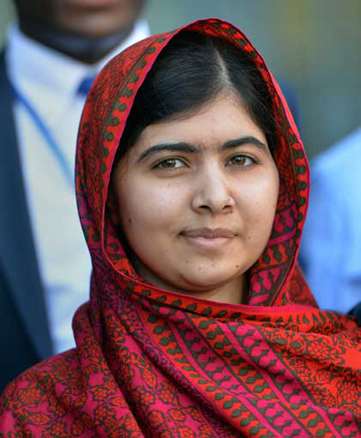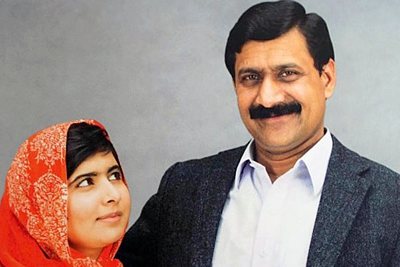Film (2015)
Documentary
Directed by Davis Guggenheim
Music by Thomas Newman; Cinematography by Erich Roland; Film Editing by Greg Finton, Brad Fuller, Brian Johnson; Animation by Jason Carpenter
With Malala Yousafzai, Ziauddin Yousafzai, Toor Pekai Yousafzai, Khushal Yousafzai, Atal Yousafzai

Malala Yousafzai, an amazingly precocious and articulate fifteen year old Pakistani girl, spoke out openly, in 2012, about the rights of girls to be educated and received from the Taliban, which could not tolerate such outspokenness, in response, an attempt on her life. With emergency surgery, she survived. And she continued to speak out.
To watch her, to get a sense of her incredible personality, vision and charm, is quite an experience, and this moving documentary by Davis Guggenheim enables just that.

Malala speaks openly about the influence her dear father, Ziauddin, has had upon her life and her sense of vision and purpose. The title of the film He Named Me Malala is a tribute both to him and to her father’s vision and expectations for his daughter. A short animated sequence exhibits the story of her namesake, a kind of Joan of Arc character who stood up against British colonialism a century ago.
That short animated sequence is representative of the sort of inventive documentary this is, and how creatively Guggenheim manages to navigate the several arenas of Malala’s life which become the hubs of the story.
Much of this charming and moving documentary shows footage from Malala’s family resituated in Birmingham, England, and displays in a vividly down to eart way how she is very much a sweet and bright teenage girl and, at the same time, a courageous and noble thinker and orator. With ultimate charm and poise, Malala speaks about her plight and her vision, in words that ring of sincerity and truth.
The remarkable thing about this girl, and what Guggenheim captures so well, is the sense of her basic personhood – her down-to-earthness and her genuine way of accepting both her fate as a victim of Taliban violence and her role as a defender of human rights.
Malala’s biography is entitled I Am Malala: The Story of the Girl Who Stood Up for Education and was Shot by the Taliban (2013) and Guggenheim has obviously adapted it to suit the focus of the film which very distinctively emphasizes the important relationship between Malala and her father. There is a strong sense of tradition, rectitude and family purpose that travels through the film, and the courage that Malala exhibits signifies something not only about her remarkable self-sufficiency, but, as well, about the strong sense of connection and support she receives from her family, and, in particular, from her father.
Self-effacing and humorous, Malala also dispels any sense of self-righteousness, again a strong message from the film. The communicated sense of the basic ordinariness which she exhibits along with her incredible extraordinariness is strikingthroughout.
-BADMan
Leave a Reply